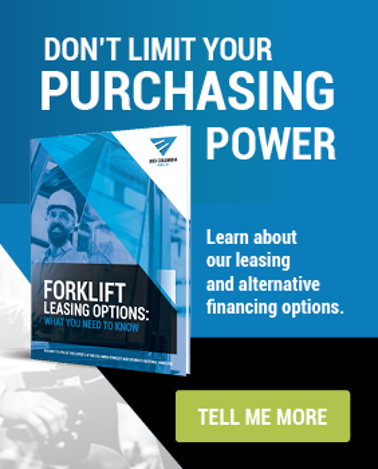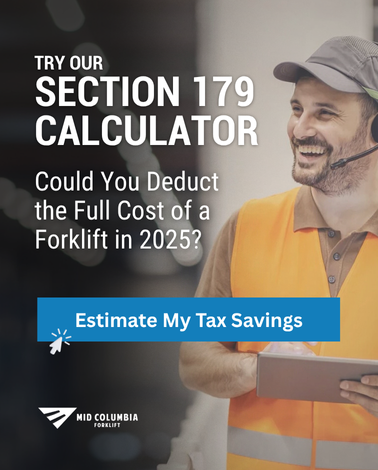What’s the Value of a Used Forklift?
by Dan Livingston, on January 2, 2025 at 7:45 AM
 If only evaluating forklift listings were as simple as shopping for a used car. Unfortunately, there’s no Kelley Blue Book to consult when it comes to determining the value of a used forklift.
If only evaluating forklift listings were as simple as shopping for a used car. Unfortunately, there’s no Kelley Blue Book to consult when it comes to determining the value of a used forklift.
When it’s time to add used equipment to your fleet or want to trade-in an aging model towards something new, you are likely wondering what’s the value of my used forklift? Luckily, the factors that influence used forklift pricing can be relatively straightforward. Read on to learn how to evaluate a listing and determine the value of your used forklifts.
What to Look for in a Used Forklift
Used forklift buyers typically pay the most attention to three things:
- Operating performance
- Operating hours
- Overall forklift age
If a used forklift cannot run properly or lift its capacity, its value is limited at best. Buyers need a dependable machine that can still run, move, and lift loads. Be prepared to test drive used equipment to ensure its quality. Similarly, higher hour meters can point to lower value (although certain brands are more valuable than others even with more usage history.)
Finally, the overall age or manufacturing year of a forklift will help you determine how it has been used. Divide the hour meter by the years since it was built to get an idea of how hard it has been worked.
What Impacts a Used Forklift’s Value?
Beyond performance, age, and hour meter, several other factors can impact the value of a used forklift.
Manufacturer Brand: Used forklifts manufactured by well-known brands will typically cost more than less popular brands.
Load Capacity: It’s true for both new and used forklift - the more powerful the equipment, the higher the price. Learn How to Read a Forklift Load Capacity Chart here.
Tire Type: Pneumatic tires for outdoor operations and rough terrain are more expensive to replace than cushion tires. Expect to pay more for equipment with pneumatic tires.
Fuel Type: LPG and diesel-engine forklifts typically cost more when used. Electric forklifts are less valuable because they require battery reconditioning or replacement. LPG or diesel forklifts are more rare on the used forklift market, driving prices higher.
Appearance: Are your operators causing cosmetic damage to your forklifts? Dents and scrapes can drive down used forklift prices. Visible signs of damage can point to potential accidents that could cause internal harm for forklifts.
Customization & accessories: Equipment with specialized accessories and forklift attachments, such as fork positioners or side shifters, can be more valuable. The same goes for industry-specific configurations, like Box Car forklifts.
Maintenance History: Buyers will want to see maintenance records on any used equipment for sale. Make sure any equipment you are buying or selling has a full maintenance history available to see how the forklift has been taken care of.
How to Buy Used Forklifts?
When it comes to buying used forklifts, you have many options. While some equipment is available in secondary auction sites and Craigslist-style listings, you should be cautious. Buying used equipment from a dedicated dealer can help ensure you are buying quality forklifts that will still perform well for your business. Make sure that you can review maintenance history and test drive any equipment before committing to a purchase. 
Need more help navigating the used forklift market? Download our free Used Forklift Buyer’s Guide for expert advice on getting the best value for your equipment purchase.
Trust the experts at Mid-Columbia Forklift and MidCo Material Handling. Our staff can help you determine whether a used forklift will meet your needs and can review our available equipment with you.
You can also contact your nearest dealership location directly:
Auburn 253-854-5438
Pasco 509-547-7413
Wenatchee 509-663-9009
Yakima 509-457-5137
Further Reading
How To Choose a Forklift Dealer: What You Need To Know
How to Calculate Downtime Costs and Avoid Unplanned Downtime
When Leasing a Forklift Makes Sense





